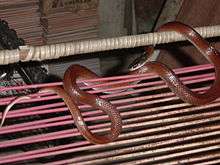Pseudoboa neuwiedii
| Pseudoboa neuwiedii | |
|---|---|
 | |
| Pseudoboa neuwiedii in a house in El Limón, Venezuela | |
| Scientific classification | |
| Kingdom: | Animalia |
| Phylum: | Chordata |
| Class: | Reptilia |
| Order: | Squamata |
| Suborder: | Serpentes |
| Family: | Colubridae |
| Subfamily: | Xenodontinae |
| Genus: | Pseudoboa |
| Species: | P. neuwiedii |
| Binomial name | |
| Pseudoboa neuwiedii (A.M.C. Duméril, Bibron & A.H.A. Duméril, 1854) | |
| Synonyms | |
Pseudoboa neuwiedii, commonly known as the ratonel, is a species of snake endemic to northern South America.[3]
Geographic range
Pseudoboa neuwiedii is found on the mainland of South America from Colombia to The Guianas, and in Brazil along the Amazon River,[4] as well as in Grenada,[5] and Trinidad and Tobago.[3]
Etymology
The specific name, neuwiedii, is in honor of German naturalist Prince Maximilian of Wied-Neuwied.[6]
Description
Pseudoboa neuwiedii grows to a maximum total length (including tail) of 1 m (39 in).[3]
Dorsally, it is reddish brown, either uniform or with some scattered small black spots. The top of the head and neck are black or dark brown. There may or may not be a yellowish crossband or collar across the temples and occiput. Ventrally, it is yellowish.[2]
Behavior
Pseudoboa neuwiedii is a powerful constrictor.[3]
Diet
Pseudoboa neuwiedii feeds on any animal it can capture and subdue. Individuals have been reported to consume snakes as large as or larger than they themselves are.[3]
References
- ↑ "Pseudoboa neuwiedii ". The Reptile Database. www.reptile-database.org.
- 1 2 Boulenger, G.A. 1896. Catalogue of the Snakes in the British Museum (Natural History). Volume III., Containing the Colubridæ (Opisthoglyphæ and Proteroglyphæ),... Trustees of the British Museum (Natural History). (Taylor and Francis, Printers.) London. xiv + 727 pp. + Plates I.- XXV. (Oxyrhopus neuwiedii, pp. 112-113.)
- 1 2 3 4 5 Boos, Hans E.A. (2001). The Snakes of Trinidad and Tobago. Texas A&M University Press. College Station, Texas. ISBN 1-58544-116-3.
- ↑ Freiberg, M. 1982. Snakes of South America. T.F.H. Publications. Hong Kong. 189 pp. (Pseudoboa neuwiedii, p. 107.)
- ↑ Schwartz, A., and R. Thomas. 1975. A Check-list of West Indian Amphibians and Reptiles. Carnegie Museum of Natural History. Pittsburgh, Pennsylvania. 216 pp. ("Pseudoboa neuwiedi [sic]", p. 190.)
- ↑ Beolens, Bo; Michael Watkins; Michael Grayson. 2011. The Eponym Dictionary of Reptiles. Johns Hopkins University Press. Baltimore. xiii + 312 pp. ISBN 978-1-4214-0135-5. ("Neuwied's False Boa Pseudoboa neuwiedi [sic]", p. 189.)
Further reading
- Duméril, A.-M.-C.; G. Bibron; and A.[-H.-A.] Duméril. 1854. Erpétology générale ou histoire naturelle complète des reptiles. Tome septième. Deuxième partie. [= General Herpetology or Complete Natural History of Reptiles. Volume Seven. Part Two.] Roret. Paris. pp. xi + 781-1536. (Scytale neuwiedii, pp. 1001-1002.)